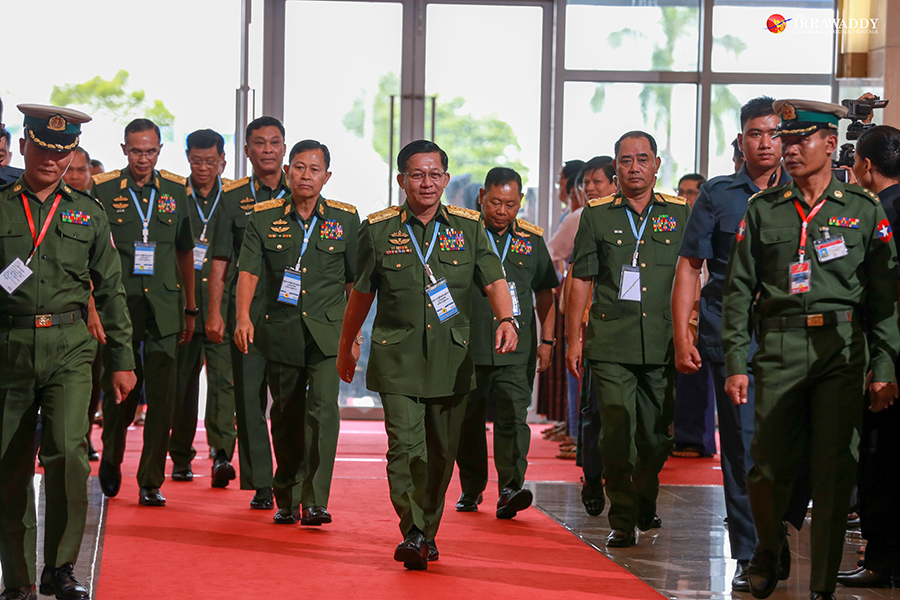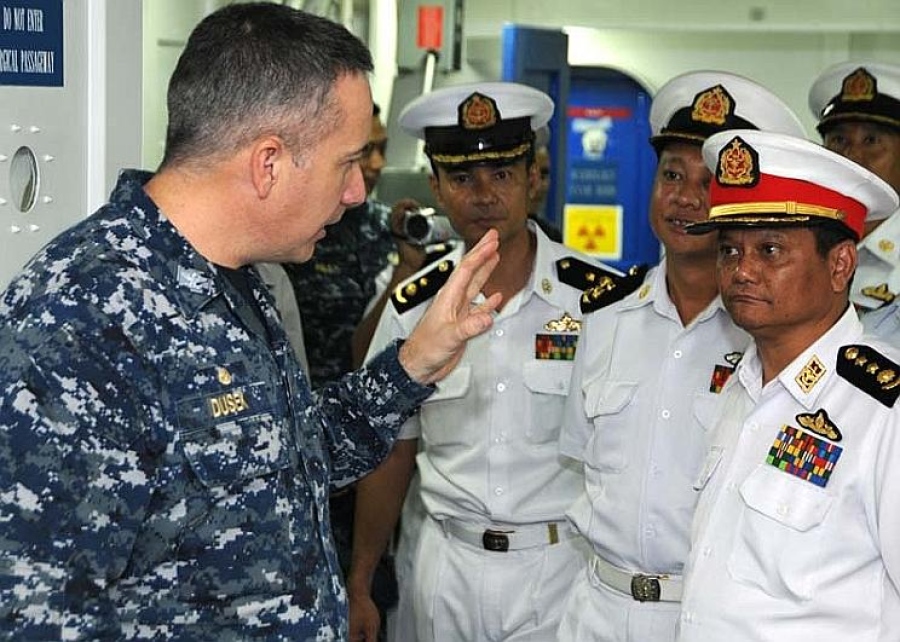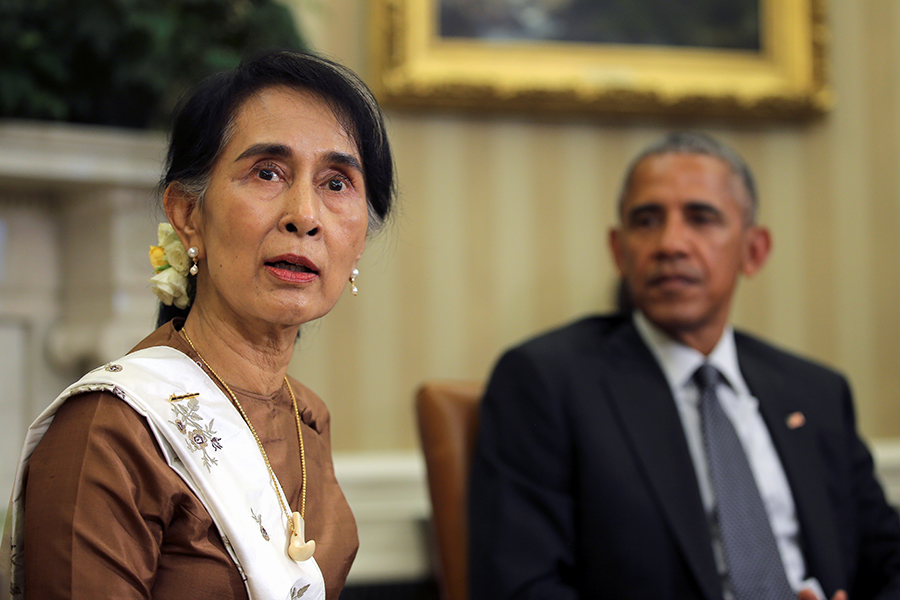Last week, we saw the Trump administration take action against Myanmar’s top generals, barring them entry to the United States for their role in orchestrating the 2017 crackdown against Rohingya Muslims.
The travel ban applies to Myanmar’s top military leader, Senior General Min Aung Hlaing, his deputy, Vice Senior General Soe Win, two other senior generals and their families. US Secretary of State Mike Pompeo said that the “Trump administration is the first government to publicly take action with respect to the most senior leadership of the Burmese military.”
The generals on the US visa blacklist are not known to have ever been to the US and were unlikely to have been planning to travel there in the near future. Since 1988, after the military brutally crushed a pro-democracy uprising, senior military officers have been strictly barred from entering the US.
But of course they have been to China, Russia, India, Japan and several other countries in Eastern Europe that are important to the Myanmar military’s strategic cooperation in the region and beyond.
Some human rights groups and other critics of the military lauded the decision taken by the US State Department as a sign that the Trump administration is demonstrating its willingness to take measures to respond to developments on the ground.
The US did not use the term “genocide” in reference to the conflict in Rakhine, or to the army’s retaliation against the Muslim armed group known as the Arakan Rohingya Salvation Army or its actions against Rohingya civilians in the north of the state in 2017. Rather, it referred to a “well-planned and coordinated” campaign of mass killings, gang rapes and other atrocities. Pompeo’s statement on the military visa ban on July 16 simply refers to “… individuals’ responsibility for gross human rights violations, including extrajudicial killings in northern Rakhine State, Burma, during the ethnic cleansing of Rohingya.”
The policies of the US are focused on changing behavior and promoting the accountability of the Myanmar military, a State Department official said.
Indeed, the question now is whether or not it will lead to any significant change in the military’s behavior, and what the implications are for Washington-Naypyitaw ties, given that the US only normalized its relations with troubled Myanmar in 2012.
Symbolic gesture
The visa ban will have little impact on the ground, according to many analysts and seasoned Myanmar watchers.
Asked about the ban, Myanmar military spokesman Brigadier General Zaw Min Tun’s reply was unexpected: “The leaders don’t travel to the U.S., and they need not travel there, so there are questions as to whether the sanctions will have an impact, but it harms the dignity of the Tatmadaw.”
The government also issued a short statement saying that it has been addressing the accountability issue through the Independent Commission of Enquiry (ICOE) formed by the military to address alleged human rights violations in northern Rakhine.
“The international community should give us time and space for the ICOE to come up with a credible report. Such action will not contribute to resolving the issue in Rakhine, but rather worsen the problems and challenges,” said Zaw Htay, director general of the President’s Office.
During a press conference on Tuesday in Naypyitaw, Major-General Tun Tun Nyi, the deputy head of the military’s information team, told The Irrawaddy that the military considered the ban an intervention by the US in Myanmar’s internal affairs and an act of bullying toward the military, government and people of Myanmar, because both the commander-in-chief and vice commander-in-chief are constitutionally appointed government representatives.
Richard Horsey, a Yangon-based analyst, told The Irrawaddy, “The US move is mainly symbolic. It doesn’t involve any financial sanctions. However, it is the first time that the two top military commanders have been personally targeted, and it may set a precedent that could be followed by other countries.”
After the outbreak of violence and the crisis in northern Rakhine State, the European Union extended a ban on selling arms to Myanmar and prolonged sanctions against high-ranking officials over their roles in the Rohingya crisis.
About 14 top military and border officials are under individual EU sanctions, barring them from traveling to or through the European bloc and freezing any assets they hold in Europe, over alleged human rights violations, including killings and sexual violence.

David Steinberg, a professor at Georgetown University in the US and a specialist on Myanmar who has published several books on the country, said that once the US imposes sanctions, it is difficult to get rid of them, as they are usually imposed by the executive branch, the legislature or both. “We saw that earlier in the case of Myanmar. Will Russia give back Crimea to the Ukraine? What about Iran?”
“All this will make Western investment more difficult, and if Min Aung Hlaing becomes president after the 2020 elections, what then?” the professor said.
Snr-Gen Min Aung Hlaing is known to have presidential ambitions and critics are speculating on what impact if any the US visa ban will have on this goal.
A Myanmar military observer who requested anonymity said that the Myanmar generals were irritated by the US visa ban. He too was cautious on whether the visa ban will have an impact on Snr Gen Min Aung Hlaing’s presidential ambitions. “It depends what the domestic laws say,” he said.
Thant Myint-U, a historian and author of several books on Myanmar including “The River of Lost Footsteps,” shared the view of many in Myanmar that the visa ban carries very little weight.
“The visa ban may have important symbolic weight in DC, but will have zero impact on the lives of people in Rakhine itself.”
Thant Myint-U, who served as an adviser to former President U Thein Sein, added, “Frankly, no one has a good plan on how to improve the plight of people in Rakhine or help refugees in Bangladesh. And we’re no longer in a time where the West can micro-manage change on the other side of the world.”
But U Pe Than, a lawmaker from the Arakan National Party, said, “We believe the Tatmadaw launched the clearance operations as a result of the Bengalis’ attacks.” Bengali is a widely used term for the Rohingya in Myanmar.
“We believe this is [an issue of] internal affairs and we don’t oppose the Tatmadaw’s action against terrorists, but anyone found committing human rights violations can be punished.”
He added that the US visa ban is nothing but an insult to the country’s sovereignty and does “nothing but put pressure on the country.”
Double standard?
Dr. Tin Maung Maung Than, an associate fellow at the ISEAS-Yusof Ishak Institute (formerly the Institute of Southeast Asian Studies) in Singapore, said that the US visa ban on the Myanmar generals cost Washington little to impose, and doubted it would be effective. He was doubtful that the Myanmar military leaders care much about the visa ban.
He then asked, “What about Philippine President [Rodrigo] Duterte?”
The domestic war on drugs ordered by the Philippine president has been blamed for thousands of deaths. The International Criminal Court (ICC) announced in February that it was carrying out a preliminary examination of the alleged crimes.
However, the US and the Philippines have historically enjoyed a special relationship, though Duterte’s pro-China stance has been both controversial and entertaining.
Concerned about China’s growing assertiveness in the South China Sea and Duterte’s shifting allegiance toward Beijing, the US has remained quiet on the issue of extrajudicial killings and crimes committed under Duterte.
Pompeo visited Manila in March and reaffirmed that the US would come to the aid of the Philippines should its vessels or forces be attacked in the South China Sea.
Unlike Thailand, the Philippines and Singapore, Myanmar doesn’t have special relations with Washington, though then President Barack Obama visited Myanmar twice when the country was opening up in 2011. Under his administration the US also normalized ties with Myanmar in the wake of the political reforms then being launched.
No flowering of democracy
Another problem involves the fact that everyone wants to take credit for Myanmar’s breathtaking “reform”, whereas many of the country’s problems only deepened after the lifting of sanctions by Obama, a development that has exposed the shallow basis of that administration’s embrace of the country.
Steinberg criticized Obama’s policy, saying that while “The Myanmar problem with the Clinton-Bush administrations was they called for regime change”, Obama also encountered problems with a policy Steinberg described as “regime modification”.
“So it is easy to show concern, disgust, disagreement with anything by imposing [sanctions on] them. But in the case of the newest Rohingya issue, however bad and essentially disgraceful and stupid the Tatmadaw was there, to get rid of them [the sanctions], will Myanmar give citizenship, rights, equity to the Rohingya, etc., which is what the US Congress will demand?” he said.
Critics now say that the trouble with Obama’s policy toward Myanmar was a lack of understanding of Myanmar’s deep-rooted ethnic conflict and a lack of sensitivity—a problem that could perhaps be described as shortsightedness or a lack of vision.
Obama’s visits to Myanmar were followed by a significant easing and eventual lifting of all sanctions on the generals who were accused of committing mass killings and human rights abuses in the country. Moreover, Obama’s administration—which along with other Western governments was impressed to see Myanmar opening up politically—controversially initiated military-to-military engagement with the Tatmadaw.

In 2016, Obama said that lifting sanctions was the right thing to do in order to ensure that the people of Myanmar see the rewards of a new way of doing business and a new government. In an article published in 2018, Politico wrote that Obama had obviously sided with aides who thought the US should engage rogue regimes in the hope of changing their behavior.
Critics say Obama’s top-down Myanmar policy illustrated a tenuous grasp of the complex situation in this country. Moreover, there was a question at the time over whether Daw Aung San Suu Kyi was in full agreement with the lifting of sanctions.
While the military and its associates walked away scot free, Myanmar descended deeper into hell.
The country did not see a flourishing and flowering of democracy and human rights, but marched into chaos, growing armed conflicts involving powerful ethnic armies both old and new, multiplying military, ethnic and religious conflicts, and a major outbreak of violence in northern Rakhine State.
Three years after lifting the sanctions a number of US officials and diplomats who were involved in Myanmar must feel guilty. The Trump administration is now beginning to take small steps to punish the military—though this is too insignificant to serve as a wake-up call to the military.
The US visa ban comes amid heightened confrontation between the civilian government and the military over amending the Constitution before the election in 2020. Some analysts warn the move can only fuel misunderstanding between the two sides.
There is a chance that the election in 2020 will be held much earlier than many expect. (In 2015 Myanmar held elections in November; the 1990 vote was held in May.) Military leaders are concerned that the National League for Democracy-led government will push through a referendum on the Constitution early next year and call an election shortly thereafter.
But the visa ban targeting the military could increase and deepen mistrust toward Daw Aung San Suu Kyi.
Horsey made the point that, “In the past, when Aung San Suu Kyi had the ear of Washington, there would have been suspicion in the military that she had endorsed [the travel ban]. There may be some residual suspicions along those lines, but the reality is that Washington made this decision as a result of its own political calculations. As we approach the Myanmar elections next year, there will be increasing points of tension between the civilian government and the military; this may be one, but my feeling is that it probably won’t be a major one.”

Neighbors in arms
In the wake of the visa ban, neighboring countries are watching developments in Myanmar closely. As major investors and donor countries, China, India and Japan are deepening their engagement with Myanmar and are unlikely to agree with the ban or imposing further sanctions.
Japanese Ambassador Ichiro Maruyama told The Irrawaddy in 2018 that Western sanctions are “utter nonsense” and said that Japan disagreed with sanctions or a trade embargo against Myanmar.
But what of the EU? We shall see if Brussels follows the US. There are other countries such as Canada and Australia that have imposed economic sanctions against the military. If the US asked other friendly countries to follow suit, they would inevitably do so.
But would a visa ban and further sanctions work on Myanmar?
Thant Myint-U pointed out that, “There’s a myth that sanctions led to the political opening in 2011. At a personal level, many in the army establishment and their friends in business did far better under sanctions than after 2011. For the generals, a Burma more integrated into the rest of the world is the risky proposition, not a return to more isolation.” This is true. Military leaders and tycoons enjoyed a golden age when the country was under blanket sanctions imposed by the West.
There is also the fear that a US visa ban will push Myanmar further into China’s orbit.
According to Swedish journalist and veteran Myanmar watcher Bertil Lintner, “The ban will have no other effect than driving Burma further into the hands of China, and it will only further complicate the delicate relationship between the military and the government at a time when the latter is attempting to amend the Constitution in order to make it more democratic.” Indeed, China aside, the relationship between the military and the civilian government has only grown more delicate.
Failure to ‘manage’ the US?
Kavi Chongkittavorn, a respected veteran Thai journalist who has trained many Myanmar reporters, said Thailand will continue to engage both the civilian government and the military in Myanmar, and that relations are going strong.
“The Myanmar case is difficult… but we have many areas to engage with Myanmar,” he said.
But he agreed that Myanmar leaders, both civilian and military, have failed to manage the US in recent years.
He said relations between Bangkok and Washington, initially damaged by the Thai military coup led by General Prayut Chan-ocha in 2014, had begun to warm thanks to the aggressive efforts of Thai diplomats to engage Washington.
In the period immediately after the coup the US downgraded the annual Cobra Gold exercise and blocked security-related aid to Thailand, but the two countries, considered traditional allies, have developed a warmer relationship recently.
In 2017, Prime Minister Prayut Chan-ocha met US President Donald Trump at the White House, signaling an upgrading of ties between the two countries. Pompeo plans to visit Thailand at the end of this month.
“US and Western governments have realized that they can’t ignore Thailand,” Kavi said. But what leverage does Myanmar have in its relations with the US and other Western countries that are critical of Myanmar?
A Myanmar military observer with in-depth knowledge said Myanmar has drawn a lesson from Thailand, which was forced to diversify its ties in the region when relations soured with Washington in 2014.
“We have made friends with neighbors…. our relationships with them are stronger than before,” the observer said, adding that Myanmar wants good relations with everyone. To that extent, Senior General Min Aung Hlaing and his associates are feeling the pinch from the US visa ban, he said.
But it is difficult to gauge how both government and military leaders in Myanmar will seek to engage with the US and the West—intellectually, personally, and in terms of their long-term vision—and to influence the narrative over the Rohingya crisis.
Since the crisis erupted in northern Rakhine in 2017, Myanmar has made little effort to send special envoys or delegations to Western capitals to explain the nuances of the lingering conflict on the ground.
A final consideration is whether the US visa ban will force Myanmar to become a proxy of China as some have speculated. This is far from a certainty.
According to Thant Myint-U, “Cooler relations with the West might seem to benefit China, but it’s not necessarily a zero-sum game. In the middle is a virulent Burmese nationalism and a domestic politics where obstinance is prized. Yes, Western sanctions may lead to greater dependence on China, but I think we’re still very far away from any government having much influence on thinking in Naypyitaw.”

















